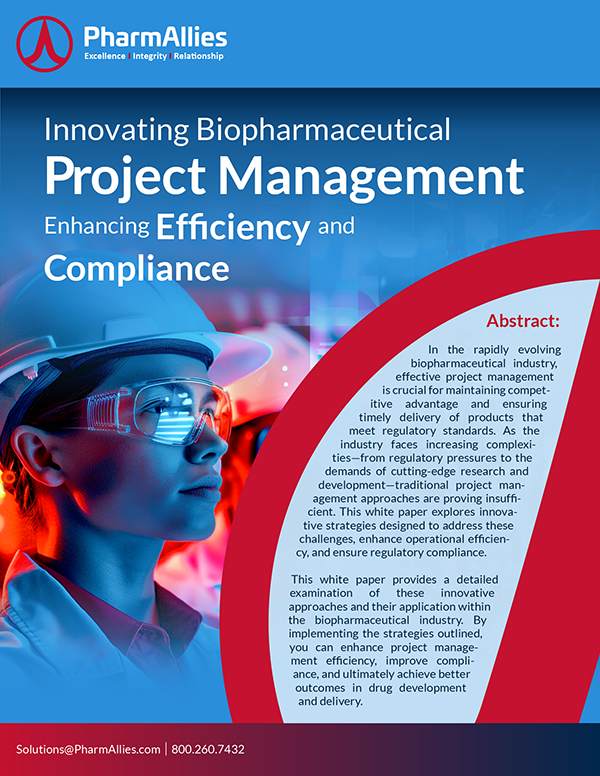Strategic Recommendations for Implementing Innovative Project Management Approaches
Introduction
In the biopharmaceutical industry, project management isn’t just about keeping timelines and budgets in check; it’s about driving innovation while ensuring compliance, efficiency, and patient safety. With the rapid advancement of new technologies like AI, machine learning, and personalized medicine, there’s a growing need for project managers to rethink their strategies.
Throughout my career, I’ve managed numerous biopharma projects that involved packaging, validation, manufacturing, quality management systems, remediation, and regulatory compliance. I’ve seen how the right project management strategies can make or break a project, especially when it comes to integrating new methodologies and technologies. In this article, I’ll share practical, strategic recommendations for implementing innovative project management approaches in the biopharmaceutical sector.
Why Innovation is Essential in Biopharma Project Management
Innovation in project management is no longer optional in the biopharma industry, it’s essential. New drug development is more complex, regulations are stricter, and competition is fiercer than ever. To succeed, you must adopt innovative project management methodologies that allow for agility, risk management, and cross-functional collaboration.
In my experience, innovation in project management means moving beyond traditional, linear approaches. It’s about adopting flexible methodologies like Agile or Lean, leveraging data from digital health tools, and being proactive in regulatory compliance. The projects where we embraced these innovations consistently delivered better outcomes, faster timelines, improved efficiency, and, most importantly, safer products for patients.
Strategic Recommendations for Integrating Innovation
1. Start Small and Scale Gradually
Introducing new methodologies like Agile or Lean into a traditionally rigid environment can be challenging. One of the most effective strategies I’ve used is to start small. Choose a specific phase of a project, like packaging validation or clinical trial design, and implement Agile principles there. This allows your team to get comfortable with the new processes before scaling them to larger portions of the project.
In one project, we introduced Agile just for the packaging team. By breaking down the project into sprints, we could deliver smaller, more manageable results, which ultimately improved the overall execution of the project. After seeing the benefits in that area, we rolled Agile out across other teams, including regulatory and manufacturing.
2. Leverage Technology to Optimize Processes
The rise of digital health tools, AI, and machine learning is reshaping how we manage biopharma projects. In my view, one of the biggest game-changers has been the use of AI to analyze large datasets, making it easier to predict project bottlenecks, optimize resource allocation, and even enhance risk management strategies.
For instance, during a remediation project I managed, AI helped us identify which phases were most likely to face delays due to regulatory compliance complexities. By flagging potential issues early, we were able to adjust our approach, resolve regulatory concerns ahead of time, and keep the project on schedule. This not only minimized delays but also prevented significant cost overruns.
While I haven’t personally worked with wearables, I’ve seen how the integration of digital health tools can provide real-time insights, improving the quality of data collected during clinical trials and enabling faster, more informed decision-making. AI and other digital technologies are revolutionizing the way we approach project management in biopharma, allowing us to be more proactive and efficient.
3. Create Adaptive Compliance Frameworks
Regulatory compliance in biopharma is non-negotiable, but that doesn’t mean it has to stifle innovation. In fact, developing adaptive compliance frameworks is one of the most effective ways to balance innovation with strict regulatory requirements. This involves building flexibility into your compliance strategies so you can adjust them based on new data or evolving project needs.
In one project involving equipment validation for a new manufacturing facility, we created a compliance framework that allowed us to adjust validation protocols in real-time as we received new data. This approach helped us stay compliant without sacrificing innovation or delaying timelines.
4. Promote Cross-Functional Collaboration
Innovation doesn’t happen in silos. For successful project management in biopharma, fostering collaboration between cross-functional teams, such as R&D, regulatory, manufacturing, and quality assurance, is essential. From what I’ve seen, regular communication between these teams not only streamlines workflows but also brings diverse perspectives that lead to better problem-solving.
In an Electronic Batch Record (eBR) implementation project I managed, weekly cross-functional team meetings proved to be invaluable. When a challenge arose in the manufacturing process, we were able to resolve it quickly because the manufacturing and quality teams were already in the loop. This level of collaboration reduced delays and enhanced the overall efficiency of the project.
5. Use KPIs to Drive Continuous Improvement
Tracking the right Key Performance Indicators (KPIs) is essential for implementing and scaling innovative project management strategies. KPIs provide a real-time snapshot of project health, allowing you to make data-driven decisions. Whether you’re focused on compliance, risk mitigation, or time-to-market, KPIs offer clear, actionable insights.
I’ve found that incorporating KPIs like cycle time efficiency, compliance adherence, and first-pass yield helps ensure that new methodologies are delivering the expected results. By regularly reviewing KPIs, you can identify areas for improvement and make adjustments that keep the project on track.
Overcoming Challenges in Innovative Project Management
Change Management
Change can be difficult, especially in an industry as regulated and risk-averse as biopharma. One challenge I’ve encountered is resistance to new project management methodologies from teams who are used to traditional approaches. To overcome this, I’ve found that gradual implementation, combined with strong leadership and clear communication, can make the transition smoother.
In one of my earlier projects, we introduced Lean methodology to a team that had been using the same processes for years. The key to success was starting small and demonstrating quick wins. Once the team saw the tangible benefits, they were more open to broader implementation.
Balancing Innovation with Compliance
While innovation is crucial, so is regulatory compliance. The challenge is balancing the two without one slowing down the other. By building adaptive compliance frameworks, fostering collaboration between teams, and leveraging the latest technologies, this balance becomes easier to manage.
I’ve seen this firsthand in projects involving new manufacturing processes. By working closely with regulatory teams from the start and keeping them updated on innovations, we managed to maintain compliance without slowing down progress.
Key Takeaways for Project Managers
- Start small when introducing new methodologies like Agile or Lean, and allow your team to get comfortable before scaling.
- Use AI and digital health tools to optimize project timelines and improve decision-making in real-time.
- Develop adaptive compliance frameworks to allow for flexibility while maintaining regulatory adherence.
- Promote collaboration between cross-functional teams to ensure innovation is integrated seamlessly across the project.
- Track KPIs to ensure continuous improvement and to measure the effectiveness of innovative project management strategies.
Conclusion
The biopharma industry is evolving rapidly, and project management must evolve with it. By adopting innovative strategies, whether it’s using cutting-edge technology, promoting collaboration, or developing adaptive compliance frameworks, you can lead your projects to success while staying ahead of the curve.
Throughout my career, I’ve seen how the right project management approach can transform even the most complex projects into streamlined, efficient operations. As the industry continues to advance, now is the time to embrace innovation in project management. By doing so, you’ll not only improve project outcomes but also ensure that your company remains competitive in an ever-evolving landscape.



